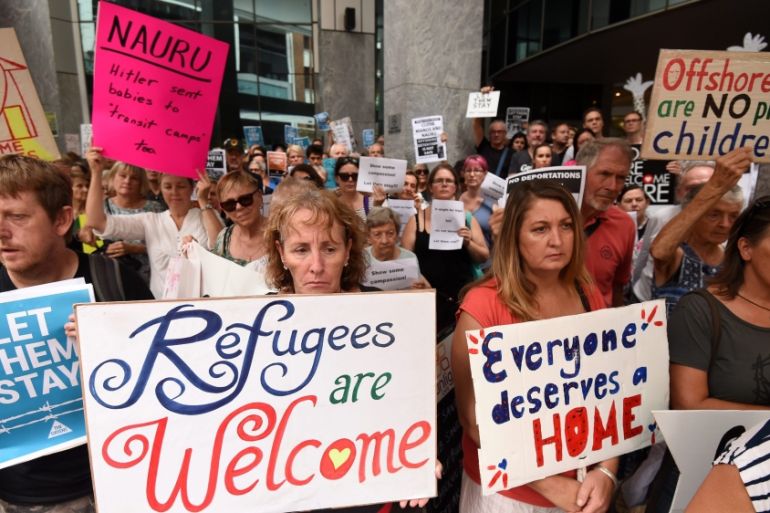Australia hospital guards baby from return to detention
Faculty refuse to discharge girl to prevent her return to detention camp as nationwide #LetThemStay campaign grows.

An Australian hospital has refused to discharge a year-old asylum-seeker patient in defiance of authorities seeking to return the child to a detention centre in the neighbouring island nation of Nauru.
Hundreds of people continue to demonstrate in solidarity with the Lady Cilento Children’s Hospital in Brisbane since it made the decision on Friday to keep the baby girl, said Mark Gillespie, a spokesman for the Refugee Action Collective, a rights group that organised protest rallies.
Keep reading
list of 4 itemsUN report charts lethal cost of migration over past decade
Conflict, climate, corruption drive Southeast Asia people trafficking: UN
Bodies of three Rohingya found as Indonesia ends rescue for capsized boat
“The worst case scenario is that the government charges in to take the child, but that is unlikely,” Gillespie added.
The baby, named Asha, was born in Australia to Nepalese asylum-seekers who were later sent to Nauru after a new migration act.

Asha was taken to the Brisbane hospital in late January to receive treatment for burns sustained after boiling water was accidently spilled on her.
She has recovered from the injuries, but a spokesman for the hospital said Asha “will only be discharged once a suitable home environment is identified”.
Queensland state’s Health Minister Cameron Dick has backed the hospital’s move with a statement saying he “strongly supports” the medical staff “to make the right clinical decisions”.
Asha is one of dozens of other asylum-seeker infants – of a total of more than 267 – facing the threat of deportation from Australia after the country’s high court earlier in the month upheld the legality of imprisoning refugees offshore.
The Australian government has defended the deportations of refugees and asylum seekers, saying they are necessary to deter people from embarking on deadly boat journeys to the country.
#LetThemStay campaign
Despite the court ruling, medical staff, teachers, church leaders, and activists have taken part in the #LetThemStay campaign calling for asylum seekers and refugees to be allowed to stay in Australia.
RT @MsMingYu: With our friends @GreenpeaceAP @GetUp @ActionAid_aus. #LetThemStay @TurnbullMalcolm pic.twitter.com/6EAp73HzrC
— Amnesty International Australia 🕯 (@amnestyOz) February 14, 2016
On Sunday, campaigners from ActionAid, Amnesty International, GetUp! and Greenpeace displayed a #LetThemStay banner on an iconic harbour in Sydney.
Ming Yu Hah, a spokesperson for Amnesty’s Australia branch, told Al Jazeera over the past two weeks the country has undergone a “watershed” period at which the Australian people are stepping forward to call on the government to change their policies towards refugees and asylum seekers.
“State governments want a shift in federal government policy, as do members of the Liberal and opposition parties,” she said.
“There have been over 100 organisations who either advocate or work formally for refugee rights, but now we are seeing many ordinary Australians from all sectors of society calling for changes.
“We have had enough of the deliberate cruelty to an already traumatised people… We are asking the government to allow us to welcome these people to our community.”
Gillespie described the “unbearable” conditions at the detention camps in Nauru. He said refugees have been living in decrepit tents in harsh tropical conditions over the past two years and do not know how long it will last.
READ MORE: Riot at Australian detention camp after refugee’s death
“Many kids suffer from bites by insects that easily get into the tents,” he said. “It is breaking people… The mental health of detainees is shocking.”
Gillespie and Hah both noted the abundance of reports of detainees trying to commit self-harm or suicide.
Hah also said there had been allegations of women and children suffering sexual abuse, but none could be verified because the government rejected requests for independent investigations.
“The major problem is that the government has been operating its refugee policies in a lot of secrecy… The government has not allowed any independent probes of the camps.”
|
|
| Families separated by Australia asylum policy |